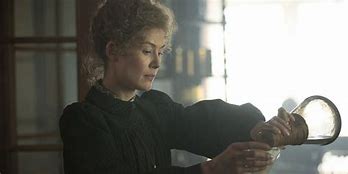
FILM REVIEW: A Luminous Performance By Rosamund Pike Elevates A Radioactive Biography

Rosamund Pike, who portrays the famed scientist Marie Curie in the new film biography, Radioactive
CREDIT: Laurie Sparham/Amazon Studios
Marie Curie, born Maria Salomea Sklodowska in 1867, embraced science from a very early age, and her achievements profoundly changed the world. Having emigrated from her native Poland to France in the final decade of the nineteenth century, she brought an instinctive and uncompromising approach to her life’s work. She called it “good science.” It included the discovery of the elements of radium and polonium (named for her country of birth), and it paved the way for chemotherapy and atomic weaponry, among other technological breakthroughs. A new movie tries to capture that genius.
Rosamund Pike stars in Radioactive, a biography of the pioneering scientist, the first woman to win a Nobel Prize and the only person to claim it in two different scientific disciplines (physics and chemistry). The director, Marjane Satrapi, the Oscar-nominated Iranian-French graphic novelist and filmmaker (Persepolis), tells the story in an ambitious but uneven fashion.
The film certainly has all of the required elements: Mme. Curie’s determination to challenge “prevailing attitudes” about science, and about women; the chauvinism of the male scientific establishment in Paris, her adopted home; her intellectual partnership with, and eventual marriage to, Pierre Curie, with whom she shared her first Nobel Prize in 1903; the sensual, liberated nature of her personal life; and her relationships with her two daughters (one of whom also earned a Nobel Prize) and her sister Bronislawa, a physician. However, many of the scenes come across as overly melodramatic. In fact, the most effective moments of the movie are often presented without dialogue, suggesting Marie’s unwavering commitment to scientific discovery. We even see her in bed in the company of a glowing vial of uranium salts.
Rosamund Pike, the acclaimed British actress and Academy Award nominee for her performance in Gone Girl, shows her range once again here. She has to make an impatient, difficult, and brilliant character shine, and she generally succeeds. The scene of a grieving Marie shocked by the tragic death of her husband, combined with radioactively glowing images of the modern dancer Loie Fuller, is really quite remarkable. Fellow English actor Sam Riley portrays Pierre Curie as dedicated and understanding, in a much more muted performance.
Marjane Satrapi, the director, worked from a script by Jack Thorne (The Aeronauts). Aside from the wedding and honeymoon scenes, the story largely plays out in demi-light, replete with rich shades of brown, gray, and gold, punctuated by the glints of red and green suggested by radioactive compounds. Importantly, it’s conceived as a series of flashbacks–memories that come flooding back to a dying Marie in a French hospital in 1934. However, the movie overreaches when it fast-forwards to several of the practical, if not exactly predictable, results of Mme. Curie’s discoveries. The inclusion of the bombing of Hiroshima in 1945, an atomic test in the Nevada desert in 1961 (with wax figurines depicting a “nuclear family”), the Chernobyl meltdown of 1986, and a chemotherapy session for a young boy in a hospital may be relevant to Curie’s work, but only serve as jarring visual and narrative distractions within the movie itself.
Marie Curie has been a recurring subject for filmmakers. Madame Curie, released in 1943, earned Oscar nominations for Best Picture, Best Actress (Greer Garson), and Best Actor (Walter Pidgeon). It plays up the romance and tones down the science, even though adapted from a biography written by Ève Curie, the protagonist’s younger daughter. The Polish production, Marie Curie: The Courage of Knowledge (2016), takes an even narrower, unfocused approach to its subject’s life. Radioactive may lose its way at times with melodramatic dialogue and narrative tangents, but it has ambition and intelligence, as well as a luminous performance by Rosamund Pike in the lead role.















